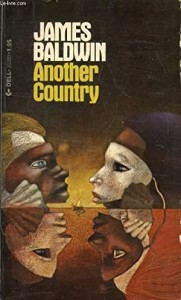
Baldwin’s third novel starts with Rufus Scott, a jazz musician, standing near Times Square, broke with nowhere to go. We don’t need to be told he is Black; Baldwin accomplishes that with a simple, economical sentence: “The policeman passed him, giving him a look.”
Once well-known with many friends, a loving family, and numerous lovers, now he is “one of the fallen—for the weight of this city was murderous.” He believes he has only one friend left, Vivaldo, a writer laboring over his first novel.
With lyricism and passion, Baldwin indicts the city’s inhabitants, always hurrying somewhere, careless of themselves and others. And then there are the artists, like Rufus’s friends who are writers, actors, musicians, singers. Divided into three parts, this novel immerses us in their world: their ambitions and weaknesses, their kaleidoscope of lovers, their fallible selves.
We learn that they know little of themselves, much less of others. Several, including Rufus, are bitterly confused about their sexuality: identifying as heterosexual while occasionally giving in to overwhelming attraction to other men. For the main characters, the ones whom we get to know, are all men. There are women but they are just devices to drive the men’s plot lines. Which are deeply painful.
Set in the U.S. and France, there are countries within countries: Harlem, Greenwich Village, Riverside Drive, various locations in the Deep South. And each person is a country unto themselves, ultimately unknowable. The story shifts between Rufus, Vivaldo, and several other characters, each trying to find their footing after unimaginable loss, sometimes driven to sex work and other degrading activities in order to survive.
The shifting relationships between them drive this long novel, as the characters make connections and then destroy them in a desperate fight for power. Perhaps a kinder word is control; they try to assert control over the other to shore up the crumbling relationship. “But it was only love which could accomplish the miracle of making a life bearable—only love, and love itself mostly failed.”
Coming to this book from the two earlier novels, I found new power and resonance in Baldwin’s use of language. Passionate, yes, and often lyrical, each sentence is weighted with meaning, pulling us ever deeper into these characters. Here is Vivaldo:
He walked out of the phone booth into the bar, which was a workingman’s bar, and there was a wrestling match on the TV screen. He ordered a double shot and leaned on the bar. He was surrounded by precisely those men he had know from his childhood, from his earliest youth. It was as though, hideously, after a long and fruitless voyage, he had come home, to find that he had become a stranger. They did not look at him—or did not seem to look at him; but, then, that was the style of these men; and if they usually saw less than was present, they also, often, saw more than one guessed.
Baldwin needs only two details to set the scene. Then there’s the quick one-two: we think Vivaldo is comfortable among men he has know all his life, and then—boom—we get the one word “hideously” to show us how dreadfully wrong we are. The next sentence gives us the synthesis: his knowledge of them helps him interpret their actions, or inaction in this case, and regain his footing after the terrible blow of feeling alone, not just a stranger but someone who has lost what once supported him.
The characters’ actions and interactions testify to Baldwin’s shrewd understanding of the human heart. Each flawed character, each cruel or selfish act is treated with love and compassion. As one character says, “‘…what can we really do for each other except—just love each other and be each other’s witness?’”
Which book by James Baldwin is your favorite?
